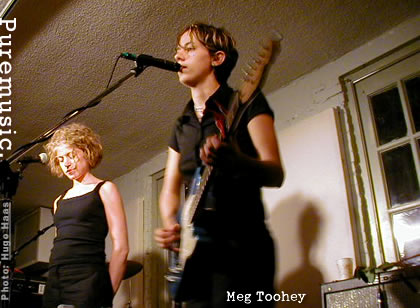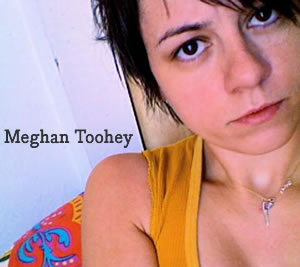
A Conversation with Steve Tannen (continued)
ST: So anyway we took all of that and we had Meg come up, Meg Toohey.
PM: Good. What's the deal with her?
ST: Okay. The deal with her, she is a Berklee graduate, she's a drummer and a singer, and she also happens to play guitar better than anyone we know.
PM: Just one of them people.
ST: Yeah. She's like Prince. She can play it all. She produces at home, produces other artists. Her pallet is broad; she eats everything, she loves it all.
PM: Wow.

ST: And I met her through Deb because when Deb got to Boston Meg sort of took her under her wing because Meg was really popular in Boston.
PM: As a songwriter herself, or as a player?
ST: She had the Meg Toohey project going on. And then she had this band called the So and So's.
PM: That's a great name.
ST: Another one of these local hero fantastic musicians, who for whatever reason, the vagaries of the record industry, sort of never were signed to Columbia for unknown reasons, and who has made a fantastic career as a side person for the likes of Lori McKenna. I know that as a solo artist she toured with--hey, baby, who did Meg tour with in Ireland?
Deb: The Saw Doctors.
PM: Oh, yeah, right.
ST: Meg's very much an entity unto herself.
But because Deb and Meg have known each other for like ten years, it's really easy for us to work in the same way that Whynot and I also work.
PM: There's a lot of great guitar stuff on the record. Of course, nobody but you will know who played what. But there are a lot of great tracks.
ST: Yeah. And some of that actually was Whynot also. But some of it was me, and some of it was Deb. But the heavy lifting is Meg. And I'll give you a great example. There's a song called "Orbiting," which is the second song.
PM: A fantastic song.
ST: And that guitar riff, I just think it makes the whole thing.
PM: Yeah.
ST: I love it. I love it. The chorus comes in, and it's got this counter melody going up, just beautiful. And that's why you play with Meg.
PM: Right, because she composed it, she came up with it, right.
ST: Yeah, man. And all of this, this is why you want to do this crazy thing in the first place.
PM: Right, because it's uphill, there's no doubt about that.
ST: I know it. I know. So then we sort of added all the pieces from people that we knew or loved. The other thing that you need to know is at this point where on the last record we were sort of done. It was like Deb and I had our dibs, and then Frank and Whynot filled in the bottom end, and then Meg sprinkled the fairy dust. At the end here, Deb was six months pregnant and sort of out of commission.
[laughter]
PM: Oh, right, done.
ST: And of course, so was I. We were just sort of like, "Okay, we're having a baby. What are we going to do? We need a crib, we need a this we need a that." And Deb's nauseous. And we basically went for help to our favorite musicians. Brad Gordon we met on the Hotel Cafe tour in 2006--just a multi-instrumentalist that we loved. And a guitarist named Steve Walsh, who I've played with since--I started playing with him in '98, '99. But we very much took different paths, and he's a Nashville stalwart guitarist now.
PM: Oh, because I live in Nashville, so I might know--
ST: Steve Walsh and Jill Walsh. He plays with--I can't tell you who, but once in a while I get an email like, "Hey, you might want to check out so-and-so" or "Oh, this is a great record, I'm on it." But look him up. He's fantastic.
Anyway, there was a song called "All this Beauty," which we were struggling with tone-wise. You know what I mean? We sort of had the '60s thing going. And I was talking with Steve and I asked him if he still had that sparkly 12-string. He's like, "Do I have the 12-string? Come on. What do you think of me?"
PM: Who sells 12-strings?
ST: I was like, "Could you lay it on?" And he did some acoustic--he punched up the whole track.
PM: Wow.
ST: And then we did the same thing with a guy named John Deley, who was Dido's music director. And I know him from the dive bar days in New York. And again we were just talking because his wife is having a baby too. And I said, "Man, you want to just take a listen and tell me what you think?" And he called me back and he's like, "I uploaded some stuff for you."
[laughter]
PM: That's amazing.
ST: Yeah. And we're all friends. Because we had a little bit of a gap here when we finished--we sort of came to a little bit of a stopping place, we were able to let these other people in and do their things, and we're really glad they did.
PM: It's so cool that you could make that space, and not only you could make it, but they could fill it, jump in there and say, "Yeah, I uploaded some stuff."
ST: I think because we knew everybody, and we'd played with everybody for years, I think that's what it was. And I don't want to leave anybody out.
PM: Nice bunch of friends, by the way.
ST: Oh, come on, you've been in the business 10, 15, 20 years longer than me. You must have some friends.
PM: Yeah, got some friends, for sure. And live in Nashville. It's like, yeah, a lot of friends.
ST: I know, dude, that's the thing about Nashville, the players in Nashville are so technically phenomenal--
PM: It's so scary.
ST: --that it intimidates me.
PM: It's like if you got a song, you can't think of an instrument that you need that you can't call three people and go, "Okay, I got 50 bucks, you want to come down and play this track for me or not." They say, "Yeah, yeah. I'll be there."
ST: That's it, it's like, which didgeridoo player do we want? That guy has awesome tone, but this guy is a real great whatever. Exactly.
PM: Oh, yeah, you can call up certain guys, well, I'm covered. Just bring a bunch of stuff. And you know he plays eight things extremely well.
ST: Exactly, exactly. We've had a couple friends move down there, and it's intimidating, man.
PM: Do you ever go down to Nashville to play?
ST: We played there in 2006 twice just sort of passing through.
PM: And they probably weren't the gigs you deserved?
ST: That was a thing about 2006, because 2005 we're essentially like any other indie band and very unknown, and really tough gigs in the Midwest. Great shows in Boston and New York and Philly, and then you get out to Detroit, and it's rough. And then after Happiness came out and then Say I Am You came out, I think it's because there was a lot of TV and film usage, we would get to a place--Chicago is probably the best example--we're in our ancient Toyota, packed like sausage, touring as a duo.
PM: Amazing.
ST: And we showed up at this place that we begged them to give us a show. And they said, "Okay, we'll give you the 7:00 o'clock show" at this bar called Martyrs. And it was sold out. And we were like--
PM: Wow. How exciting.
ST: Well, beyond exciting. It was like funny.
PM: It's like, "Wow, they're here to see us?"
ST: Like, "Who are you? Did I go to high school with you?"
[laughter]
ST: Exactly. And Nashville, we actually played--shit, I forget the venue?
PM: The Basement?
ST: No. It was a split level where the big band gets the bottom and the little band gets the top. It's like this great loft area for the top.
PM: Oh, the Mercy Lounge.
ST: The Mercy Lounge. Exactly. So we got there, okay, and The Fray, who had just hit number one, are playing.
PM: Oh, my God.
ST: So we get there. We can't even park because of the 15-year-old girls. And I was just thinking like, that's unnecessary to do to our egos right now--to sort of like put 500 people downstairs and like 10 people upstairs. And our show actually was almost full.
PM: Really?
ST: It was really well attended, just with people who like knew the records.
PM: Amazing.
ST: And it was awesome. You know what I mean?
PM: Yeah.
ST: The difference between that and not that is [laughs] the difference between wanting to go on and not.
PM: Oh, yeah. It's beyond night and day.
ST: Totally. continue
print
(pdf) listen to clips
puremusic home

